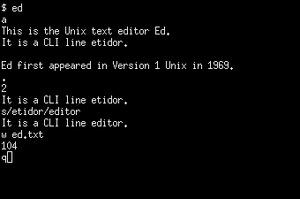
ed is a text editor for Unix-like operating systems. It is a line editor, meaning it works in a CLI environment where everything is done by typing commands, and each line is edited one by one.
ed, somewhat like its successor vi, works in two modes, command and input. In command mode characters the user inputs are interpreted as commands, and in input mode they are interpreted as text added to the buffer.[1]
ed was part of the original Unix operating system from 1969.[2] It remains part of POSIX and the Open Group standards for UNIX operating systems.[3]
Legacy
Due to its reputation as a user-hostile environment, ed has mostly been replaced by TUI and GUI screen editors and is rarely used today, but it was influential for many popular Unix tools still used today.
The command line tool grep was directly inspired by the ed command g/re/p and sed's s/regexp/replacement command was inherited from ed.[4]
ed would serve as a major influence to the line editor ex, from which would later come the screen editor vi, whose variants remain some of the most popular TUI text editors.[5][6]
References
- ↑ https://pubs.opengroup.org/onlinepubs/9799919799/utilities/ed.html
- ↑ https://man.cat-v.org/unix-1st/1/ed
- ↑ https://pubs.opengroup.org/onlinepubs/9699919799/utilities/contents.html
- ↑ https://www.gnu.org/software/ed/manual/ed_manual.html
- ↑ https://ex-vi.sourceforge.net/ex.html
- ↑ https://ex-vi.sourceforge.net/vi.html
